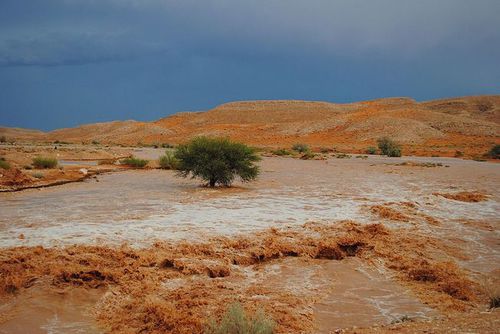July 4, 2018
Kyoto University Irrigates Desert with Flash Floods
Keywords: Environmental Technology

Image by Syed Wali Peeran Some Rights Reserved.
An International Study Group consisting of Kyoto University, Japan and Mutah University, Jordan have started operation of a reservoir using an optimal strategy based on a strict mathematical proof, announced Kyoto University in March 2018. The group proposed an irrigation scheme for harvesting water from floods in a desert and storing the water in the reservoir to use for irrigation. The group actually built a prototype in an arid region of Jordan, and results of the study appeared online in "Stochastic Environmental Research and Risk Assessment," an International Academic Journal, on March 5, 2018.
There have been efforts in the past to establish agricultural water management facilities in harsh environments outside of Japan for academic purposes. However, this study is the first example which examined an operation strategy based on a strict mathematical proof.
The success of this prototype as an interdisciplinary effort between water resources engineering and analysis identifies the scheme as a feasible option for water resource development in harsh environments. In particular, using the concept of a "viscosity solution" to a certain partial differential equation makes it possible to use an optimal operation strategy which does not involve smooth on/off control of the pumps.
Arid regions distributed widely throughout the world, including the Middle East and North Africa, are facing problems such as salt accumulation in and excessive dependence on exotic rivers and fossil groundwater. Establishing irrigation agriculture that effectively uses the limited water resources in such harsh environments has grown more urgent. At the same time, damage caused by unexpected floods is said to have increased, resulting in an even greater need for an irrigation system that addresses these problems.
Related
"JFS Newsletter"
Related
"Popular Articles"
- New Nano-Bubble Technology May Help Dissolve Sludge and Improve Water Quality
- Japanese Firm Begins Development of Tidal Power Generation System
- Small Hydropower Generation System Developed for Use in Seawater, Weight Cut by Half
- Constructed Wetland Facility Established by Japanese University Purifies Livestock Farming Drainage
- Toyota CRDL Succeeds in World's First Artificial Photosynthesis Using only Water and CO2


